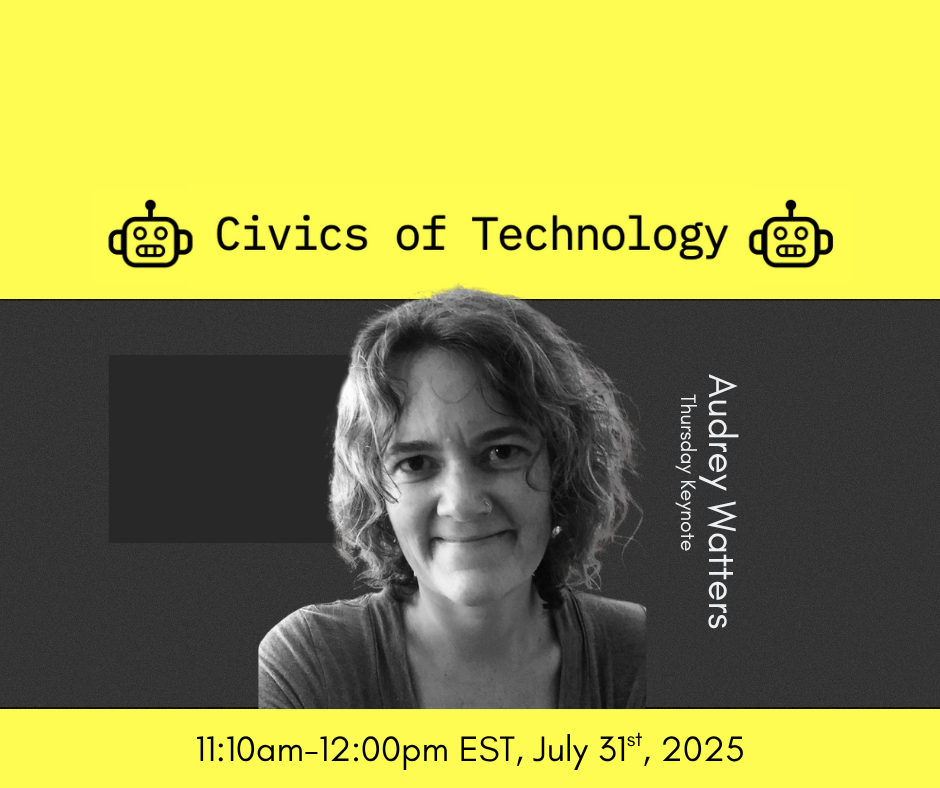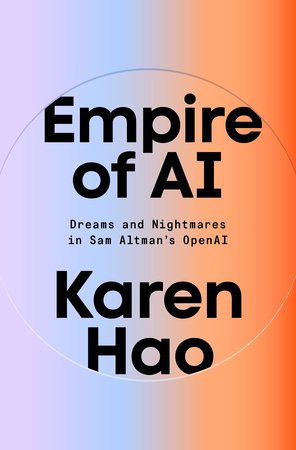Communal Resistance to Artificial Systems
Join us for our 4th Annual Civics of Technology Online Conference held online on July 31st and August 1st, 2025, from 11-3 pm EST
Raising Funds for Civics of Tech.
Civics of Technology is a grassroots organization. We aren't beholden to the interests of specific donors or funders. It's a labor of love. And we are fully committed to keeping all the things we do, including our conference, free to all.
But for those who are able and willing, we would greatly appreciate financial support from our community. If you are willing and able to support our conference and our ongoing work, please consider supporting us here. From 2022 to 2025, Civics of Tech has operated with our Executive Directors covering all costs for the website, but we want to create a more sustainable model long-term with small donations.
One-time donations will be used to provide stipends to our conference speakers.
For those who make recurring contributions, we will use your support to maintain our website and pursue additional projects and activities.
We will always be transparent about how donations are spent. At least once per year, we will give a budget report of all contributions we received and where that money was used.
Conference Theme: Communal Resistance to Artificial Systems
We are excited to announce that our fourth annual Civics of Technology conference will be held online on July 31st, from 11-3pm EST and on August 1st, 2024 from 11-3pm!
We are delighted to share our featured keynotes: Ms. Audrey Watters and Dr. Chris Gilliard.
We would like to thank Loyola University Maryland School of Education’s Center for Equity, Leadership, and Social Justice in Education for sponsoring our keynotes.
Ms. Audrey Watters is a writer, a scholar, and a self-described serial dropout. As “Ed-tech's Cassandra," her writing has appeared in multiple publications including her newsletter, Second Breakfast, blog Hack Education and her book Teaching Machines (MIT Press, 2020) which examines the pre-history of personalized learning. Ms. Watters has published four collections of her public talks, The Monsters of Education Technology (2014), The Revenge of the Monsters of Education Technology (2015), The Curse of the Monsters of Education Technology (2016), and The Monsters of Education Technology 4, as well as a book arguing that students should control their digital identities and digital work, Claim Your Domain. She was a recipient of a Spencer Education Journalism Fellowship at Columbia University School of Journalism for the 2017-2018 academic year.
Dr. Chris Gilliard is a writer, professor, and speaker. His scholarship concentrates on digital privacy, surveillance, and the intersections of race, class, and technology. He is an advocate for critical and equity-focused approaches to tech in education. His writings have been featured in the New York Times, the Washington Post, Wired Magazine, the Chronicle of Higher Ed, and Vice Magazine. He is a Visiting Research Fellow at the Harvard Kennedy School Shorenstein Center, a member of the UCLA Center for Critical Internet Inquiry Scholars Council, and a member of the Surveillance Technology Oversight Project community advisory board. Gilliard is a member of the inaugural (2022 – 2024) cohort of the Just Tech Fellowship.
The fourth annual conference theme is Communal Resistance to Artificial Systems. Our themes over prior years have been Visioning Just Futures (Year 1), Liberatory Tech Actions (Year 2), and Tech Imaginaries (Year 3). This year we'd like to turn toward the role of community and collective actions in retaining and centering the human in a world increasingly turning toward artificial systems.
In addition to our exciting keynotes, our conference will also feature:
Community-building activities to promote collective resistance to artificial systems
A day 1 closing panel from the Civics of Technology board
A day 2 closing panel led by Shana White from the Kapor Center
A book club conversation about Karen Hao’s new book: Empire of AI
Plenty of additional sessions proposed by our community (see below)
Conference Norms
Please be patient listeners, understanding that our positionalities in relation to power influence our interactions, and recognize that impact matters more than intent. Attendees should respect the preferences and dignity of fellow conference participants, including at the conference. Please use pronouns if listed and respect the social media sharing preferences of presenters (e.g., do not share without consent). Our conference also aims to be accessible and all sessions should turn on the option to “show captions.” Moreover, we hope participants will commit to advancing more just futures. Please contact Dan, Marie, or Jacob or use our contact form if you have any problems or concerns during the conference.
Day 1 — Thursday, July 31st
11:00-11:10am EST
-
Room 1
Welcome & Introduction to the Conference
Community Building Activity
Dan Krutka, Marie Heath, & Jacob Pleasants
Day 1 Keynote | 11:10-12:00pm EST
-

Keynote
Day 1 Keynote
Ms. Audrey Watters
12:05-1:00pm EST
-
Room 1
Using “Urgentcraft” to Stand Against Surveillance Ed Tech
Jeffrey Austin (he/him/his)
Participants will use Paul Soulellis’ “urgentcraft’ principles–a set of tactics for solidarity and public advocacy in times of crisis–to build community action plans to resist the rise of AI-powered surveillance ed tech that threatens to erode efforts to build and grow police-free schools rooted in trust and safety.
Rear Windows: a Modern Adaptation of Hitchcock’s Narrative as a Means of Critiquing AI
Eleanor Dare, Dylan Yamada-Rice
This talk will discuss an online interactive theatre performance we created as a means of examining and allowing others to critically engage with Artificial Intelligence (AI).
Navigating AI Through Critical Media Literacy
Julianna Kowlessar (Joo-lee-ah-nuh Koh-luh-zar)
This session aims to highlight the advantages of a critical media literacy-based approach in fostering an awareness and in-depth understanding of artificial systems, such as artificial intelligence (AI) technologies and their impact on the educational domain, in particular.
-
Room 2
Silicon Heartland? Yes, But Not in My Sister’s Backyard
Heidi Reed, Ph.D., J.D. (High-dee she/her/hers)
SK Hynix and Purdue University are collaborating to build a microchip fabrication plant, a heavy industry activity, in an area originally zoned for residential housing, literally in my sister’s backyard. I turned the community’s resistance at the West Lafayette City Council meeting and rezoning vote into a student role play.
Teaching for (Tech) Resistance
Lee Skallerup Bessette, PhD (she/her)
I will work through the first-year writing class I offered during the Fall 2024 semester, themed "Resistance is not Futile" which sought to equip the students to be able to critically interrogate the technologies that they encounter every day.
Domains of AI-Awareness: Supporting Informed Resistance
Dani Dilkes (she/her)
This session will introduce the Domains of AI Awareness framework as a alternative to AI Literacy models which assume adoption and use of Generative AI technologies as the desired (or potentially only) outcome of becoming "AI Literate". This framework creates space for the possibility of informed resistance, focusing on individual agency to make choices on AI use that align with their own values while recognizing GenAI technologies and practices as entangled in complex sociopolitical networks.
-
Room 3
When Communities Design the Future
Kalkidane Yeshak (Kel-kuh-dawn E-shack, she/her)
This session examines how three American cities developed different approaches to resisting facial recognition technology, revealing that who participates in designing resistance determines whether communities can effectively democratize algorithmic power.
Code Green: A youth-participatory educational program enabling youth with data science for social advocacy
Bavisha Kalyan (she/her), Natalie Alvarado (she/her), Spenshy Meliscat (he/him), Stephanie Martinez (she/they), Brenda Mathias (she/her), Casey De Finnda (he/him), Luca Duffy (they/any)
Through a framework of youth participatory action research and liberatory pedagogies, Peoples Public Lab created a curriculum around justice, data science, and mixed-methods research through a summer program in Newark, New Jersey. The presentation will share lessons learned from liberatory and critical theory-based curriculum and program development and insights into youth perspectives and visions for the future of Newark.
1:05-2:00pm EST
-
Room 1
Digital Belonging and Participatory Tech
Bonnie Stewart (she/they)
A reflection on 20 years in participatory media and tech...and the lessons on belonging and digital practice that I hope we can hold onto as automation and enclosure encroach.
Critical Computing Education from Kindergarten to College: A Literature Review
Rafi Santo, PhD (he/him), Jean Ryoo, PhD (she/her), Michael Lachney, PhD (he/him)
What does the research literature have to say about what students should actually learn when it comes to critical computing education? In this session, we share the results of a systematic literature review of 184 computer science education research articles spanning K12 and higher education that seeks to answer this question. We highlight examples and trends in the literature around teaching (1) enduring understandings, (2) concepts and topics, (3) social practices, and (4) ethical standpoints related to critical computing education.
GenAI Ethics Made Accessible: Facilitating Classroom Discussions
John Bartucz (Bar-toosz, he/him), Galyna (gah-LEE-nah) Arabadzhy (ah-rah-bah-DJEE, she/her), Shreepriya (SHREE-pree-ah) Dogra (DOE-grah, she/her)
This session provides an accessible starting point for educators and students to engage in meaningful discussions about GenAI, utilising four ethical frameworks: Utilitarianism, Deontology, Rawls’ Veil of Ignorance, and Critical Analysis. The session includes ideas for practical activities that can be adapted for use across different higher education classrooms to help students reflect, question, and imagine more just GenAI & tech futures.
-
Room 2
Interrogating Our Past to Prepare for Our Present
Jessa Henderson, Ph.D. (she/her)
In this session, participants will interrogate an article from 2005 that highlighted fears about the future of learning in the internet age, and discuss the lessons to be learned to counter today’s AI frenzy based on where we’ve been before.
Resisting Creatively: A Card-Based Futures Workshop with Teacher Communities
Pravindharan Balakrishnan
How can we critically raise the awareness of teacher communities in a technologically-mediated classroom? The answer may lie in the combination of futures thinking and playful speculation through the futures card game!
-
Room 3
Encouraging Non-Technical Perspectives on "AI"
Elizabeth Bacon (she/they)
This session shares the experience of a high school classroom that investigated the concept of "artificial intelligence" through a set of different lenses, using the historical context of the field to better understand how different AI technologies have been perceived over the years, and how the perception and promise of AI, not just its technological underpinnings, influence its impacts and adoption.
Techno-utopian dreams, Techno-political education
Saemi Jung (Say-mee, Jung (Not Carl Jung like German, but with a J sound), she/her/hers)
In this session, we discuss examples of sweeping state initiatives that shape public education in the age of AI. We use this time to consider ways in which we can resist and challenge the growing power of EdTech in public education.
2:05-3:00pm EST
-
Panel: Theorizing Caregiver Resistance to EdTech
Charles Logan; Alexandra Thrall; Faith Boninger; Velislava Hillman; Andy Liddell
Come hear from a panel of people from within and beyond academia discuss caregivers' resistance to the imposition of digital platforms in schools. We'll consider specific acts of everyday resistance and possible theories of change for realizing future mass organizing around issues at the intersection of technology, school, and our children’s rights.
Bonus Book Club Session 3:05-4:00pm EST.
Join for a discussion of Karen Hao’s new book: Empire of AI.
Day 2 — Friday, August 1st
11:00-11:10am EST
-
Room 1
Welcome & Introduction to the Conference
Community-Building Activity
Dan Krutka, Marie Heath, & Jacob Pleasants
Day 2 — Friday, August 1st
Day 2 Keynote | 11:10-12:00pm EST
-

Keynote
Day 2 Keynote | 11:20-12:20pm
Dr. Chris Gilliard
12:05-1:00pm EST
-
Room 1
System Thinking and Learning in Interactive Digital Narratives
Rahmin Bender-Salazar, He/Him ([ rah - M EE N ] [ b EH n d er ] - [ s ae - l uh - z ah r ]); Breanne Pitt (She/Her); Christian Roth (He/Him)
This presentation examines the diverse disciplinary foundations underpinning a transdisciplinary approach to integrating media literacy, IDNs and systems and thinking in educational settings. It introduce the concept of Systemic Learning IDNs: Interactive Digital Narrative experiences explicitly designed to support learners in exploring, understanding, and reflecting on complex systems and interdependencies.
Feeling Rules of AI Literacy and Affective Alternatives
Andrea Baer (an-dree-uh bare, She/Her)
In this presentation, I will apply sociologist Arlie Hochschild’s concept of feeling rules to examining AI literacy discourse and frameworks. Recognizing the feeling rules implicit in these documents can be a starting point for recognizing how we think and feel about generative AI (GenAI) discourse and how we wish to engage in conversations and efforts to teach and learn about or against GenAI in ways that align with our pedagogical goals and values.
The Three-Part Illusion of AI Chatbots
Christa Albrecht-Crane (She/Her)
This presentation demonstrates a method for exploring AI chatbot programs for educators in the humanities who often lack a technical background in computer science. I present a hands-on exploration, revealing (1) how language models function as next-word predictors, (2) how user interfaces are designed to create the illusion of a conversation, and (3) how a fictional chatbot persona aims to manipulate users into believing they are interacting with a sentient entity. This approach can be used as part of faculty development or as the basis for classroom exercises with students to encourage the analysis of social, political, and ethical implications of generative AI technologies.
-
Room 2
Centering Student Voices in Resisting Surveillance
Ian Linkletter (He/Him)
Students are outraged by mandatory academic surveillance technology, and their voices are all around us. I will share how I found them on Reddit, Twitter, and Google Chrome Web Store reviews, and helped make them heard. View this session on Ian’s YouTube channel: https://youtu.be/nfoo7WNN-eQ
What Can’t ChatGPT Say? Language, Resistance, and the Strange Powers We’re Forgetting
Erin Rose Glass (She/Her)
This talk invites participants to explore how AI systems like ChatGPT flatten language and thought, and how reclaiming language’s wilder, stranger powers can be a form of resistance. By drawing on poetic and philosophical traditions, it asks what kinds of expression artificial systems can’t replicate, and why that matters for our collective future. Also read more on Erin’s blog.
-
Room 3
Preparing Teachers for Disobedient Design: Cultivating Tech-Critical Classrooms from the Start
Kristin Hemingway
This session invites participants to reimagine teacher preparation as a space for critical tech resistance, using the lens of disobedient design to help early-career educators question and reshape the artificial systems embedded in their classrooms. Rooted in culturally sustaining pedagogy, the workshop offers practical tools and bold imagination to support new teachers in building classrooms where critique, culture, and care lead the way.
1:05-2:00pm EST
-
Room 1
AI and the Future of Academic Labor
Lindsay Weinberg & Robert Ovetz
This talk will address how academic workers are organizing against Generative AI. It will argue for the importance of a collective politics of refusal, given the ways AI-enabled tools are being imposed to deskill, monitor, and exploit educators.
Empowering So-Called Digital Natives: Teaching Privacy Calculus Theory as Resistance to Artificial Systems
Rachel Terry
Learn how teaching privacy calculus theory can empower students and communities to critically evaluate the risks and benefits of digital self-disclosure, fostering resistance to data extraction and algorithmic control. This session shares practical classroom strategies and resources for raising privacy consciousness in the age of artificial systems.
Fighting the good fight - go rogue or go home
Kate Molloy (Mol-oi, She/Her); Clare Thomson (She/Her)
This interactive workshop will provide space to reflect the rapid advancements in AI dominate the EdTech discourse and the prevailing populist and productivity narratives that they are perpetuating in our lives and work. We can choose to adapt, resist, or go rogue and alter the direction of digital learning and more broadly
-
Room 2
Disrupting the Efficiency Imperative
Dr. Bruna Damiana Heinsfeld
This session explores how the pursuit of efficiency has become a dominant logic in educational technology, shaping the development and justification of tools from teaching machines to AI. Join us for a conversation on how reclaiming education from optimization logics can open space for more critical, relational, and justice-centered futures.
Teach less, be less? A call to resist
Marte Henningsen, Dr. Bruna Damiana Heinsfeld
This dialogue-based session critically explores how emerging educational technologies increasingly promise to reduce the time spent teaching. Together, we will reflect on what these promises reveal (and conceal) about how such systems reframe the meaning of being a teacher into, paradoxically, a move away from teaching itself.
The quantified teacher and their resistance
Marte Henningsen (She/Her)
In this talk, I will explore the different conceptions of a teacher’s role and highlight that educational AI narratives reinforce a reduced and sanitised view of teachers and their work, namely the quantified teacher. As this then impacts their room and capacity of refusal and resistance, I use Dewey’s philosophy of education to propose an alternative conception of teaching, which allows space for a collective development and a collective refusal.
-
Room 3
Owning the Means of Publication: The Radical Possibilities of Community Creation
Zoe Wake Hyde (She/Her)
This hands-on workshop guides attendees through making their own zine, start-to-finish, as a means of reflecting on the radical histories and potential futures of publishing in the name of circulating our collective knowledge.
2:05-3:00pm EST
-
Panel: Empowering Communities by Developing Critical AI Literacy
Dr. Pati (Pah-tee) Ruiz (she/her), Digital Promise
Shana V. White, Ed.S (she/her), Kapor Foundation
Ace Parsi (Por-see; he/him), iCivics
Zachary (Zăk) Cote (Co-tay) (he/him), Thinking Nation
Come hear from a panel of people working in non-profit spaces about how educators can empower communities through critical AI Literacy initiatives.

